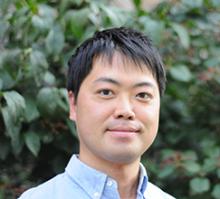Hirokazu Shirado
I have explored how social fluidity can affect the ability of groups to cooperate (H.Shirado, et al. (2013). Quality versus quantity of social ties in experimental cooperative networks. Nature Communications, doi:10.1038/ncomms3814). Other work has explored “hybrid systems” involving both humans and machines interacting on the same plane. For instance, I have investigated how the addition of artificial intelligence agents (also known as “bots”) to social systems of real people can affect the behavior of individuals and groups (e.g., H. Shirado and N. A. Christakis (2017). Locally noisy autonomous agents improve global human coordination in network experiments. Nature 545, 370-374).
In this particular experiment, I developed a networked coordination game in which groups of human subjects interact with a few autonomous bots. This study, involving over 4,000 online subjects arrayed into more than 230 groups, demonstrated that some randomness or error in behavior actually works to facilitate the achievement of global optima, and could well be an important catalyst for further studies concerning ways to enhance group performance.
In new and ongoing experiments, that are part of my dissertation, involving what we call “Bayesian bots,” I expect to be able to show that, working with humans within online social systems, these simple bots can help groups of people to help themselves in the face of social dilemmas. My work has relevance to how humans can work together to tackle problems inherent in collective coordination, cooperation, navigation, evacuation,
sharing, and so on.articular, I focus on social networks and the implications of social network characteristics for network interventions. My recent work focuses on the inter-individual dynamics of social dilemmas, and it has involved the use of various novel tools and approaches, including experiments, artificial intelligence, and online software platforms. My research is principally focused on so-called “hybrid systems” involving both humans and machines interacting on the same plane. For instance, I am investigating how the addition of artificial intelligence agents (also known as “bots”) to social systems of real people can affect the behavior of individuals and groups. My work has relevance to how humans can work together to tackle problems inherent in collective coordination, cooperation, navigation, evacuation, sharing, and so on.
Publications
Shirado, H. and N.A. Christakis, “Locally Noisy Autonomous Agents Improve Global Human Coordination in Network Experiments.” Nature, Vol. 545, pp. 370-374, 2017.
A. Nishi, H. Shirado, and N.A. Christakis, “Intermediate Levels of Network Fluidity Amplify Economic Growth and Mitigate Economic Inequality in Experimental Social Networks.” Sociological Science, Vol. 2, pp. 544-557, 2015.
A. Nishi, H. Shirado, D. Rand, and N.A. Christakis, “Inequality and Visibility of Wealth in Experimental Social Networks.” Nature, Vol. 526, pp. 426-429, 2015.
H. Shirado, F. Fu, J.H. Fowler, and N.A. Christakis, Quality versus Quantity of Social Ties in Experimental Cooperative Networks. Nature Communications, Vol. 4, No. 2814, doi:10.1038/ncomms3814, 2013.
